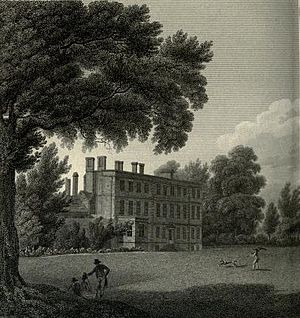Humphrey Lynde facts for kids
Sir Humphrey Lynde (born in 1579, died in 1636) was an important English person. He was a Puritan who liked to debate ideas. He was also a politician who served in the House of Commons in 1626. Puritans were a group of Protestants who wanted to make the Church of England simpler.
Early Life and Career
Humphrey Lynde was born to Cuthbert Lynde in Westminster. He was a bright student. He studied at Westminster School and then at Christ Church, Oxford university. After university, he became a law student at the Middle Temple.
He inherited land near Cobham, Surrey. Later, he bought more land in Clapham. He built a large house by the River Thames in Twickenham Meadows. Many of his children were baptized there.
King James I knighted him in 1613, so he became "Sir Humphrey Lynde." He also became a justice of the peace, which meant he helped keep law and order. In 1626, he was elected to represent Brecknock in the English Parliament.
Debates and Beliefs
Sir Humphrey Lynde was well known for his strong views against the Catholic Church. He believed the Protestant Church was the correct one.
In 1623, a big debate about the Catholic Church happened at his house in London. Two Protestant leaders, Daniel Featley and Francis White, debated with two Jesuits (Catholic priests), John Percy and John Sweet. A report of this debate was later published as a book.
Sir Humphrey Lynde died on June 8, 1636. He was buried in Cobham parish church. His friend Daniel Featley gave a speech at his funeral, praising his life.
His Writings
Sir Humphrey Lynde wrote several books and papers. In 1623, he published An Account of Bertram the Priest. This book was an introduction to an older text that argued against a specific Catholic belief about the bread and wine used in church services.
Later, a Jesuit challenged Sir Humphrey to prove that the Protestant church had always been visible throughout history. He tried to answer this in his book Antient Characters of the Visible Church in 1625. He continued this argument in 1628 with Via Tuta, the Safe Way. This book explained why he believed the Church of England's faith was the true, old, and universal faith.
Other writers, like John Heigham and John Floyd, wrote replies to his books. Sir Humphrey also wrote Via Devia, the Byway in 1630, which continued his arguments against what he saw as "Popish Error." He wrote another reply to Floyd called A Case for the Spectacles, but it was not published until after he died.
After his death, his friend Daniel Featley helped publish more of Sir Humphrey's writings. His books were reprinted many times, showing how important his ideas were at the time.
Family Life
Sir Humphrey Lynde had three sons and six daughters. One of his sons, also named Humphrey Lynde, became a church leader in Maidstone.
 | Anna J. Cooper |
 | Mary McLeod Bethune |
 | Lillie Mae Bradford |


